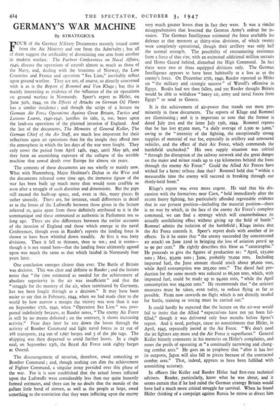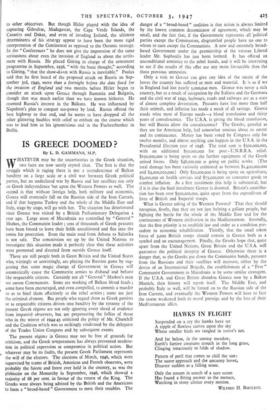GERMANY'S WAR MACHINE
By STRATEGICUS
FOUR of the German Military Documents recently issued come from the Air Ministry and one from the Admiralty ; but all of them suggest the artificiality of dissociating one arm from another in modern warfare. The Fuehrer Conferences on Naval Affairs, 1940, discuss the operations of aircraft almost as much as those of the Navy, and, dealing with the invasions of Norway, the Low Countries and France and operation "Sea Lion," inevitably reflect upon ground warfare. They are not, of course, so directly concerned with it as is the Report of Rommel and Von Kluge ; but this is mainly interesting as evidence of the influence of the air operations on ground warfare in Normandy. Speer's report to Hitler, on June 30th, 1944, on the Effects of Attacks on German Oil Plants has a similar incidence ; and though the script of a lecture on German Air Force Operations Against Great Britain, Tactics and Lessons Learnt, 1940-1941, justifies its title, it, too, bears upon the land-sea operations of the planned invasion of England. And the last of the documents, The Memoirs of General Koller, The German Chief of the Air Staff, are much less important for their reflections upon air operations than for the insight they afford into the atmosphere in which the last days of the war were fought. They only cover the period from April 14th, 1945, until May 9th, and they form an astonishing exposure of the collapse of the terrible machine that sowed death over Europe for almost six years.
The contents of these documents are not wholly or mainly new. What with Nuremberg, Major Shulman's Defeat in the West and the documents released some time ago, the immense jigsaw of the war has been built up much more than would seem credible so soon after a struggle of such duration and dimensions. But the gaps still exceed the built-up space, and, even in this, many pieces fit rather uneasily. There are, for instance, small differences in detail as to the losses of the Luftwaffe between those given in the lecture referred to, quite apart from those definitely attributed to it in the communiqué and those announced as authentic in Parliament not so long ago. There are also differences between the earlier accounts of the invasion of England and those which emerge in the naval Conferences, though even in Raeder's reports the landing force is shown to have been whittled down steadily. At first it was forty divisions. Then it fell to thirteen, then to ten; and it seems— though it is not stated here—that the landing force ultimately agreed upon was much the same as that which landed in Normandy four years later.
One conclusion emerges clearer than ever. The Battle of Britain was decisive. This was clear and definite to Raeder ; and the lecture notes that " the time estimated as needed for the achievement of absolute superiority in the air was insufficient" and that the " struggle for the mastery of the air, when terminated by Germany, has not been fought through to a decision." It may have been easier to say that in February, 1944, when we had made clear to the world by how narrow a margin the victory was won than it was on September 17th, 1940, when " Operation Sea Lion " was post- poned indefinitely because, as Raeder notes, "The enemy Air Force is still by no means defeated ; on the contrary, it shows increasing activity." Four days later he sets down the losses through the activity of Bomber Command and light naval forces as 21 out of 168 transports, 214 out of 1,697 barges and 5 of the 36o tugs. The shipping was then dispersed to avoid further losses. In a single raid, on September 13th, the Royal Air Force sank eighty barges at Ostend.
The discouragement of invasion, therefore, owed something to Bomber Command ; and, though nothing can dim the achievement of Fighter Command, a singular irony presided over this phase of the war. For it is now established that the actual losses inflicted upon the Luftwaffe were considerably less than our quite honestly formed estimates, and there can be no doubt that the morale of the gallant little band of airmen, as well as the people at large, owed something to the-conviction that they were inflicting upon the enemy very much greater losses than in fact they were. It was a similar misapprehension that lessened the German Army's ardour for in- vasion. The German Intelligence estimated the force available for defence at that moment at thirty-nine divisions, of which twenty were completely operational, though their artillery was only half the normal strength. The possibility of encountering resistance from a force of that size, with an estimated additional million recruits and Home Guard behind, disturbed the High Command. In fact there were two or three equipped divisions only. The German Intelligence appears to have been habitually at a loss as to the enemy's force. On December 27th, 1940, Raeder reported to Hitler on " the military and strategic success " of Wavell's offensive in Egypt. Bardia had not then fallen, and yet Raeder thought Britain would be able to withdraw "heavy air, army and naval forces from Egypt " to send to Greece.
It is the achievement of air-power that stands out most pro- minently in these documents. The reports of Kluge and Rommel are illuminating ; and it is important to note that the former is dated July 2ISt and the latter July 15th, 1944. Rommel reports that he has lost 97,000 men, "a daily average of 2,50o to 3,000," owing to the " intensity of the fighting, the exceptionally strong supplies of material of our foe, especially in artillery and armoured vehicles, and the effect of their Air Force, which commands the battlefield unchecked." His own supply situation was critical " through the disruption of the railway network and the great danger on the major and minor roads up to 150 kilometres behind the front through the enemy Air Force." Could the Allied Air Forces have wished for a better tribute than that? Rommel held that " within a measurable time the enemy will succeed in breaking through our thinly-held front."
Kluge's report was even more cogent. He said that his dis- cussion with the formations near Caen, " held immediately after the recent heavy fighting, has particularly afforded regrettable evidence that in our present position—including the material position—there is no way by which, in the face of the enemy Air Force's complete command, we can find a strategy which will counterbalance its actually annihilating effect without giving up the field of battle." Rommel admits the isolation of the battlefield ; Kluge insists that the Air Force controls it. Speer's report deals with another of its effects. In it he states that "the enemy succeeded (by concentrated air attack) on June 22nd in bringing the loss of aviation petrol up to 90 per cent." He rightly describes this blow as " catastrophic." He proceeds to give the figures of production as: " April, 125,00o tons ; May, 93,000 tons ; June, probably 70,000 tons. Including imported fuel, the June amount should reach about 96,000 tons, while April consumption was 205,000 tons." The diesel fuel pro- duction for the same month was reduced to 66,300 tons, which, with imported fuel, could be made up to 94,000 tons, " while the April consumption was 194,000 tons." He recommends that " the strictest measures must be taken, even today, to reduce flying as far as possible. From now onwards no flight which is not directly needed for battle, training or testing must be carried out."
It could hardly be expected that the lecture on the air-war would fail to insist that the Allied "expectations have not yet been ful- filled," though it was delivered only four months before Speer's report. And it need, perhaps, cause no astonishment that Hitler, in April, 1945, repeatedly jeered at the Air Force. "We don't need the jet fighters anymore and the Air Force is superfluous." General Koller bitterly comments in his memoirs on Hitler's complaints, and notes the perils of operating m "a continually narrowing and chang- ing combat area." He goes on to prophesy that " after it has lost its outposts, Japan will also fall to pieces because of the contracted combat area." That, indeed, appears to have been fulfilled with astonishing accuracy.
In officers like Koller and Raeder Hitler had first-rate technical r advisers. Raeder, particularly, knew what he was about, and it seems certain that if he had ruled the German strategy Britain would have had a much more critical struggle for survival. When he found Hitler thinking of a campaign against Russia he strove to divert him to other objectives. But though Hitler played with the idea of capturing Gibraltar, Madagascar, the Cape Verde Islands, the Canaries and Dakar, and even of invading Ireland, the ultimate determinants of his strategy appear to have been the more rigid interpretation of the Continental as opposed to the Oceanic strategy. In the " Conferences " he does not give the impression of the same seriousness about even the invasion of England as about the settle- ment with Russia. He placed Goring in charge of the armament programme in September, 1936, " with the basic thought," according to Goring, " that the show-down with Russia is inevitable." Paulus said that he first heard of the proposed attack on Russia on Sep- tember 3rd, 1940, more than a fortnight before the date fixed for the invasion of England and• two months before Hitler began to consider an attack upon Greece through Rumania and Bulgaria, though that was much earlier than we have known hitherto. He resented Russia's interest in the Balkans. He was influenced by Napoleon's plan to conquer sea-power by land. Russia offered the best highway to that end, and he seems to have dropped all the other glittering baubles with ielief to embark on the course which was to lead him to his ignominious end in the Fuehrerbunker in Berlin.



































 Previous page
Previous page